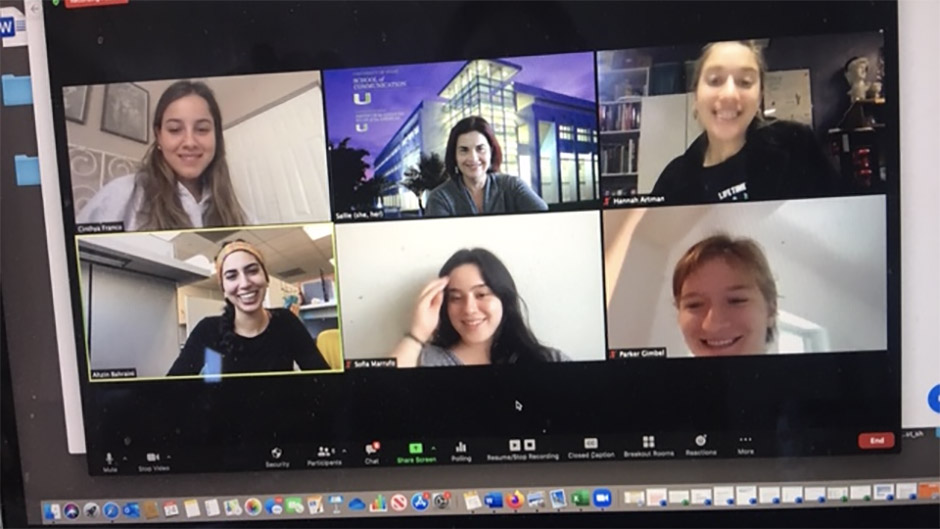Researchers at the University of Miami, Lehigh University in Pennsylvania, and the University of Arizona are conducting a study on voter influences and trends within the Latinx community during the 2020-21 US presidential election and transfer of power.
The team, led by Associate Professor Sallie Hughes, aims to determine what role communication played in motivating Latinx voters to support either incumbent Republican President Donald Trump or Democratic Presidential Nominee Joseph Biden.
“The main objective of this study is to better understand the relationship between political participation, on the one hand, and communication, transnational and local experience, and Latinx identity formation on the other,” Hughes said.
Doctoral students Hannah Artman and Ahzin Bahraini, as well as SoC undergraduates Shawn Fortune, Cinthya Franco, Sofia Marrufo and Parker Gimbel, form the Miami study team. The study was supported by the University of Miami Institute for the Advanced Study of the Americas, where Hughes is a research lead and Bahraini is a Distinguished Graduate Fellow.
The working hypothesis of the study is that political communication mobilized Latinx voters by appealing to aspects of group and personal identity, as well as US-based and transnational experiences with countries of origin or ancestry, that are very different across Latinx communities and contexts.
“The study that we are doing is analyzing unexpected voting patterns that we saw in Miami and Arizona and Pennsylvania,” said Shawn Fortune, an undergraduate research assistant majoring in electronic media. “We saw traditional voting patterns change a bit, and what we are doing is analyzing why.”
Researchers will conduct semi-structured interviews with Trump and Biden supporters with key national origin subgroups. Hughes’ team in Miami will focus their research on Cuban Americans in greater Miami, while researchers at UA and Lehigh will focus on Mexican Americans in Arizona and Puerto Ricans in Pennsylvania, respectively.
“In Arizona, community organizations working over the last four years increased Mexican American voter registration and turnout for Biden, while in Miami, media messaging and campaign events seemed key in activating Cuban Americans and others to vote for Trump in greater percentages,” Hughes said.
“In Pennsylvania, we want to understand more about Puerto Rican voters and why the percentage for Trump went up considering the poor federal response to recovery after Hurricane Maria,” she continued.
Together, the three locations allow the teams to compare motivations across different patterns of participation, organization and ancestry or country of origin, Hughes said.
The information gathered through interviews will be used to identify patterns of identification related to issues, campaigns, and the candidates, and how communication platforms helped facilitate the dissemination of information during the 2020-21 election cycle.
The team will also explore how similar Latinx community members made sense of political messages through interactive focus group conversations. This will help facilitate open conversations that illuminate processes of decision making and identification.
Undergraduate participants will learn the procedures of an academic research study through hands-on experience while the principal investigators ensure that the team’s efforts provide academics with substantive information on how communication and identity shaped mobilization of Latinx communities.
Students are also curious about the role the pandemic may have played. “I think people were influenced more by technology because of COVID and as a communicator it makes me want to look into how that happened and why there was such a shift,” Fortune said.
Hughes and her team argue that historic shifts in Latinx voting, toward the Republican Party at the national level and toward the Democratic Party in Arizona, need to be understood from a constructivist standpoint that illuminates how Latinx voters receive, make sense of, subjectively experience, and share information about political candidates, parties and campaigns.
“I am really pleased that we have designed a study with the intention to advance academic theories of communication and political incorporation, potentially have an impact on campaigns and public opinion, and support student professional development through research experience,” Hughes said.







